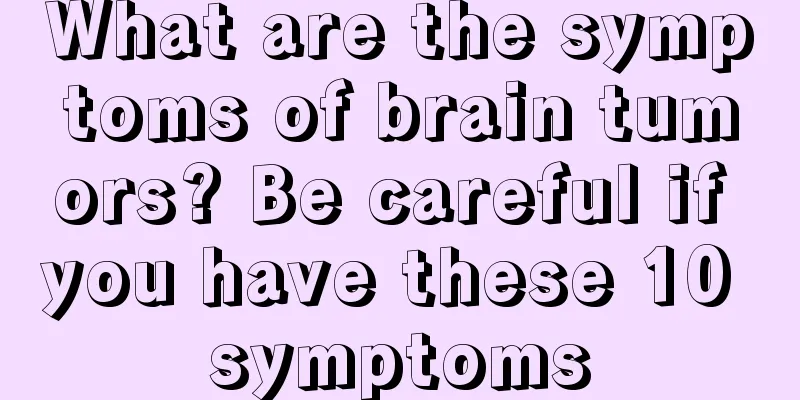What are the symptoms of brain tumors? Be careful if you have these 10 symptoms

|
Brain tumors can affect the functions of various systems of the human body, causing headaches, nausea, vomiting, and affecting the patient's endocrine system. They can also cause movement disorders, sensory disorders, and language, intelligence, hearing, vision and other disorders, which are extremely harmful to the human body. The brain is a very important organ in the human body. If a tumor occurs in the brain, it will have a great impact on the patient's health and daily life. Brain tumors can cause a series of symptoms in patients. Knowing these symptoms in time can help to detect and treat the tumor in time. So, what are the symptoms of brain tumors? 1. Headache Headaches in patients with brain tumors usually occur at night and in the early morning, especially when getting up. In addition, headaches can worsen when defecating, sneezing, and coughing. Patients may also experience projectile vomiting, after which the headache symptoms can be slightly relieved. 2. Hemiplegia Due to the compression of the tumor, the patient may experience weakness or paralysis on one side of the limbs or body. 3. Hemisensory disturbance The patient may experience numbness on one side of the body, decreased sensation of moisture and pain, etc., and may also have disorders of two-point discrimination, position sense, texture sense, graphic sense and solid sense. 4. Language Function Decline The patient's language function is impaired and he may lose the ability to express himself normally or be unable to understand other people's language. 5. Changes in Intellectual and Mental Health The patient becomes very slow and lazy, suffers memory loss or even memory loss, and in severe cases may also lose judgment or orientation, and experience mental changes such as indifference, irritability, and bad temper. 6. Epileptic seizures Localized or generalized seizures may occur. 7. Vision Changes The patient's vision may be affected, with unexplained vision loss and visual field changes. 8. Endocrine disorders Female brain tumor patients may experience symptoms of endocrine disorders, such as menstrual disorders and infertility. Male patients may experience sexual dysfunction, loss of libido, impotence, etc. Some patients may experience facial changes, obesity, gigantism, and acromegaly. 9. Hearing loss Patients often experience tinnitus, hearing loss, or even hearing loss. 10. Cerebellar and brainstem symptoms Patients may experience ataxia, have problems with daily walking, and walk unsteadily with a staggering gait. They may also experience difficulty swallowing, coughing when drinking water, and hoarseness. |
<<: How to treat cerebral hemisphere tumors? What are the treatments for cerebral hemisphere tumors?
>>: What is head and neck tumor? How to treat head and neck tumor?
Recommend
Is lung cancer cancer?
Is lung cancer a cancer? The cornflower shadow in...
Male breast cancer is actually more dangerous
Nowadays, more and more people are suffering from...
What are the first aid and care for organophosphorus poisoning
The so-called organophosphorus poisoning is the m...
Why does pituitary tumor recur?
Why do pituitary tumors recur? Pituitary tumors a...
Thyroid cancer is not incurable
Many people feel that their life is hopeless afte...
Experts teach you how to prevent pancreatic cancer through diet
It is more effective to prevent pancreatic cancer...
On which day after chemotherapy for breast cancer does the reaction become severe
On which day after chemotherapy does the reaction...
Intestinal infarction symptoms and treatment methods
When intestinal infarction occurs, it is often ac...
How does ultrasound examination help liver cancer treatment? Introduction to the role of ultrasound examination for liver cancer
How can ultrasound examination help in the treatm...
What are the diagnostic methods for nasopharyngeal carcinoma?
Nasopharyngeal carcinoma is a common malignant tu...
Why do hairs grow longer the more they are cut?
I believe that as long as the hot summer comes, m...
The cost of early-stage lung cancer treatment
Consult an expert. How much is the cost of lung c...
What causes a cold lower abdomen?
Some female friends may find that their lower abd...
Not enough autologous fat
Insufficient autologous fat is actually mainly ca...
Preventing prostate cancer starts with changing bad habits
Prostate cancer is a relatively serious male dise...









